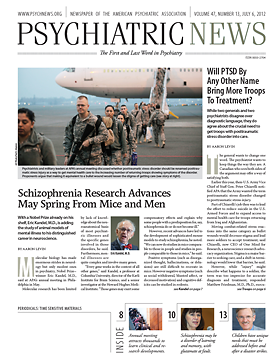For individuals receiving psychiatric treatment following a first episode of psychosis, recovery is often a relative term. It is hard to pinpoint when and how an individual feels as though he or she has recovered from an episode of psychosis.
According to a study in the June Psychiatric Services, symptoms, acceptance, self-assessment of goals, and personal meaning can all affect how individuals perceive recovery.
Deborah Windell, M.Sc., and Ross Norman, Ph.D., of the Department of Health Outcomes and Health Services Research of the London Health Sciences Centre, Ashok Malla, M.B.B.S., of the Douglas Mental Health University Institute at McGill University, and colleagues evaluated the personal definitions of recovery described by 30 individuals treated for first onset of psychosis over a two-year period.
Through semistructured interviews and using Smith and Osborn’s Interpretative Phenomenological Analysis as a guideline, the researchers compiled and analyzed data to determine what qualifies as recovery for study participants. The goal of the study was to understand how participants view and qualify recovery.
Individuals who identified themselves as being currently recovered were asked to elaborate on their definition of recovery, and those who did not feel they were recovered were asked to describe what factors would indicate that they had recovered.
Although the majority of participants indicated that they had recovered, the researchers categorized their personal definitions and criteria for their recovery. Interviewers did not use specific disorder terms, such as schizophrenia and psychosis, but used the participants’ terms to describe their experiences and symptoms.
Researchers separated the data into three domains of recovery—illness recovery, psychological and personal recovery, and social and functional recovery.
“Illness recovery” referred to the alleviation of symptoms or illness episodes. Twenty-three individuals (77 percent) included cognitive, positive, or negative symptoms in their definition of illness recovery, and three described controlling the influences of their symptoms rather than completely eliminating them as a step toward recovery.
“Psychological and personal recovery” addressed individuals who said they regained a sense of control and self while still experiencing symptoms. “Knowing something was wrong,” and “understanding the illness,” were among the themes mentioned by 20 participants (67 percent). Researchers linked this to an “acceptance of illness.” They found that perception of “being able to do something about it” or to “put it in perspective” included identifying avenues of treatment, controlling the way in which symptoms were experienced, and implementing specific lifestyle changes to support recovery.
Within the “Social and Functional Recovery” domain, 12 participants (40 percent) described gaining or maintaining employment as essential to their recovery. Eighteen participants (60 percent) incorporated themes of being able to have successful daily social interactions, and 12 identified ability to sustain social relationships. Although positive family relationships were often cited, they were rarely described as essential. Independent adult living and maturity were also mentioned by some participants as indicators of social recovery.
The study results pointed to the importance to the participants of combinations of these recovery domains. Twenty-three participants (76 percent) proposed a combination of definitions to recovery with two or more recovery domains, while only three individuals’ (10 percent) definition included just one specific recovery domain.
Medication was also an important aspect of recovery for some study participants. Six cited taking medication as a requirement for recovery, while five qualified not needing medication as recovery. The researchers noted that neither physical nor spiritual health was mentioned by participants, attributing this to the participants’ younger age and the course of treatment early in the disease process.
“The findings of this study could also contribute to the development of outcome measures of recovery relatively early in the course of illness,” said the authors regarding individuals starting treatment for the first time. “Long-term trajectories of outcome could be positively influenced by taking into consideration young peoples’ own perspectives and means of recovery.”
They concluded that more research is needed to understand how mental health service users shape their definition of recovery over time and whether a more specialized approach is needed for treating individuals with first-episode psychosis.

